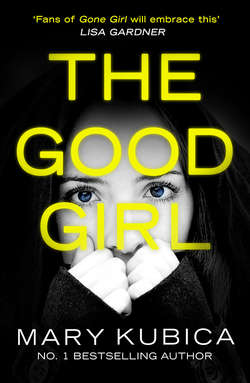Читать книгу The Good Girl: An addictively suspenseful and gripping thriller - Mary Kubica, Mary Kubica - Страница 15
ОглавлениеEve
After
I’m looking through Mia’s baby book when it hits me: in second grade she had an imaginary friend named Chloe.
It’s there in the yellowing pages of the album, written in my own cursive in blue ink somewhere along the margin, sandwiched between a first broken bone and a wicked case of the flu that landed her in the emergency room. Her third-grade picture covers part of the name Chloe, but I can make it out.
I gaze at the third-grade picture, this portrait of a happy-go-lucky girl still years away from braces and acne and Colin Thatcher. She flashes this toothless grin with a mop of flaxen hair engulfing her head like flames. She’s splattered with freckles, something that has disappeared over time, and her hair is shades lighter than it will eventually be. The collar of her blouse is unfolded and I’m certain her scrawny legs are cloaked in a pair of hot pink leggings, likely a hand-me-down from Grace.
There are snapshots lining the pages of the baby book: Christmas morning when Mia was two and Grace seven, sporting their matching pajamas while James’s greasy hair stood on end. First days of school. Birthday parties.
I’m seated at the breakfast nook with the baby book spread open before me, eyeing cloth diapers and baby bottles and wanting it all back. I put in a call to Dr. Rhodes. To my surprise, she answers.
When I tell her about the imaginary friend, Dr. Rhodes takes off in psychological analysis. “Oftentimes, Mrs. Dennett, children create imaginary friends to compensate for loneliness or a lack of real friends in their lives. They often give these imaginary friends characteristics that they long for in their own lives, making them outgoing if the child is shy, for example, or a great athlete if a child is clumsy. Having an imaginary friend isn’t necessarily a physiological problem, assuming the friend disappears as the child matures.”
“Dr. Rhodes,” I respond, “Mia named her imaginary friend Chloe.”
She grows quiet. “That is interesting,” she says and I go numb.
I become obsessed with the name Chloe. I spend the morning on the internet trying to learn everything there is to know about this name. It’s a Greek name that means blooming...or blossoming or verdant or growth, depending on what website I search, but regardless, the words are synonymous with one another. This year it’s one of the more popular names, but back in 1990 it ranked 212th among all American baby names, slipped in between Alejandra and Marie. There are approximately 10,500 people in the United States right now with the name Chloe. Sometimes you find the name with an umlaut over the e (nearly twenty minutes is lost trying to find the meaning of those two dots over the vowel, and when I do—its purpose simply to differentiate between the o and e sounds at the end of the name—I realize it’s been a waste of time), sometimes without. I wonder how Mia spells it, though I won’t dare ask. Where would Mia have come up with a name like Chloe? Perhaps it was on the birth certificate of one of Mia’s prized Cabbage Patch Kids, flown in from Babyland General Hospital. I go to the website. I’m astounded to find new skin tones for this year’s babies—mocha and cream and latte—but no reference to a doll named Chloe. Maybe another child in Mia’s second-grade class...
I research famous people named Chloe: both Candice Bergen and Olivia Newton-John named their daughters Chloe. It’s the real first name of author Toni Morrison, though I highly doubt Mia was reading Beloved in the second grade. There’s Chloë Sevigney (with the umlaut) and Chloe Webb (without), though I’m certain the first is too young and the second too old for Mia to have paid any attention to when she was eight.
I could ask her. I could climb the steps and knock on the door of her bedroom and ask her. That’s what James would do. He’d get to the bottom of this. I want to get to the bottom of this, but I don’t want to violate Mia’s trust. Years ago I’d seek James’s advice, his help. But that was years ago.
I pick up the telephone, dial the numbers. The voice that greets me is kind, informal.
“Eve,” he says and I feel myself relax.
“Hello, Gabe.”
